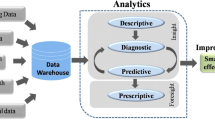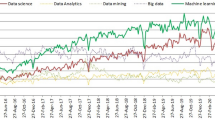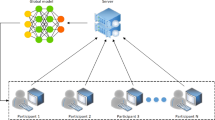Abstract
As the Internet of Things (IoT) progresses, federated learning (FL), a decentralized machine learning framework that preserves every participant's data privacy, has grown in prominence. However the IoT data possessed by corporations and enterprises frequently has different distributed properties (Non-IID), which has a negative influence on their federated learning. Throughout the local training stage, this issue makes client forget about global information, which therefore slows convergence in general and reduce accuracy. The suggested technique called FedARD, which depends on relationship-based insight distillation, to improve the mining of higher grade global knowledge through local algorithms from a superior dimensions viewpoint over their term of local training in order to maintain global knowledge and prevent forgetting. In order for students to further efficiently acquire global knowledge, it also established an entropy-wise adaptive weights module to control the proportional of loss in single sample knowledge distillation against relational knowledge distillation. FedARD performed stronger than other sophisticated FL approaches in terms of convergence speed along with classification accuracy, as determined by a set of studies on CIFAR10 as well as CIFAR100.






Similar content being viewed by others
Data availability
Not applicable.
References
Al Asqah, M., Moulahi, T.: Federated learning and blockchain integration for privacy protection in the internet of things: challenges and solutions. Future Internet 15(6), 203–222 (2023)
Al-Wesabi, F.N., Mengash, H.A., Marzouk, R., Alruwais, N., Allafi, R., Alabdan, R., Alharbi, M., Gupta, D.: Pelican optimization algorithm with federated learning driven attack detection model in internet of things environment. Future Gener. Comput. Syst. 148, 118–127 (2023)
Chen, Z., Tian, P., Liao, W., Chen, X., Guobin, X., Wei, Y.: Resource-aware knowledge distillation for federated learning. IEEE Trans. Emerg. Top. Comput. 11, 706–719 (2023d)
Chiang, Y.H., Terai, K., Chiang, T.W., Lin, H., Ji, Y., Lui, J.C.: Optimal Transport based one-shot federated learning for artificial intelligence of things. IEEE Internet Things J. 11(2), 166–2180 (2023). https://doi.org/10.1109/JIOT.2023.3293230
Gao, D., Wang, H., Guo, X., Wang, L., Gui, G., Wang, W., Yin, Z., Wang, S., Liu, Y., He, T.: Federated learning based on CTC for heterogeneous internet of things. IEEE Internet Things J. 10, 22673–22685 (2023b)
Gu, X., Sabrina, F., Fan, Z., Sohail, S.: A review of privacy enhancement methods for federated learning in healthcare systems. Int. J. Environ. Res. Public Health 20(15), 6539–6564 (2023)
Huang, X., Chen, Z., Chen, Q., Zhang, J.: Federated learning based QoS-aware caching decisions in fog-enabled internet of things networks. Digital Commun. Netw. 9(2), 580–589 (2023)
Issa, W., Moustafa, N., Turnbull, B., Sohrabi, N., Tari, Z.: Blockchain-based federated learning for securing internet of things: a comprehensive survey. ACM Comput. Surv. 55(9), 1–43 (2023)
Li, B., Shi, Y., Kong, Q., Qingyun, D., Rongxing, L.: Incentive-based federated learning for digital twin driven industrial mobile crowdsensing. IEEE Internet Things J. 10, 17851–17864 (2023a)
Manzoor, S.I., Jain, S., Singh, Y., Singh, H.: Federated learning based privacy ensured sensor communication in IoT networks: a taxonomy, threats and attacks. IEEE Access 11, 42248–42275 (2023)
Myrzashova, R., Alsamhi, S.H., Shvetsov, A.V., Hawbani, A., Wei, X.: Blockchain meets federated learning in healthcare: a systematic review with challenges and opportunities. IEEE Internet Things J. 10, 14418–14437 (2023)
Pei, J., Li, S., Zhi, Yu., Ho, L., Liu, W., Wang, L.: Federated learning encounters 6g wireless communication in the scenario of internet of things. IEEE Commun. Stand. Mag. 7(1), 94–100 (2023)
Prokop, K., Połap, D., Srivastava, G., Lin, J.-W.: Blockchain-based federated learning with checksums to increase security in internet of things solutions. J. Ambient. Intell. Humaniz. Comput. 14(5), 4685–4694 (2023)
Shang, E., Liu, H., Yang, Z., Junzhao, D., Ge, Y.: FedBiKD: federated bidirectional knowledge distillation for distracted driving detection. IEEE Internet Things J. 10, 11643–11654 (2023f)
Wang, B., Chen, Y., Jiang, H., Zhao, Z.: PPeFL: privacy-preserving edge federated learning with local differential privacy. IEEE Internet Things J. 10, 15488–15500 (2023g)
Wen, H., Yue, W., Jia, H., Wang, Z., Duan, H., Min, G.: Communication-efficient federated learning on non-IID data using two-step knowledge distillation. IEEE Internet Things J. 10, 17307–17322 (2023e)
Yaacoub, J.-P., Noura, H.N., Salman, O.: Security of federated learning with IoT systems: issues, limitations, challenges, and solutions. Internet Things Cyber-Phys. Syst. 3, 155–179 (2023)
Yadav, K., Kariri, E., Alotaibi, S.D., Viriyasitavat, W., Dhiman, G., Kaur, A.: Privacy protection against attack scenario of federated learning using internet of things. Enterp. Inf. Syst. 17(9), 2101025 (2023). https://doi.org/10.1080/17517575.2022.2101025
Yang, A., Ma, Z., Zhang, C., Han, Y., Zhibin, Hu., Zhang, W., Huang, X., Yafeng, Wu.: Review on application progress of federated learning model and security hazard protection. Digital Commun. Netw. 9(1), 146–158 (2023)
Zhang, H., Hou, Q., Tingting, W., Cheng, S., Liu, J.: Data augmentation based federated learning. IEEE Internet Things J. 10, 22530–22541 (2023c)
Funding
None.
Author information
Authors and Affiliations
Contributions
VT; AS-Conceptualization; Methodology; Software; Formal analysis; Writing-Original Draft. RSM; TM-Investigation; Supervision. PM; SBP-Writing-Review & Editing; Supervision; Project administration.
Corresponding author
Ethics declarations
Conflict of interest
The authors declare that they have no known competing financial interests or personal relationships that could have appeared to influence the work reported in this paper.
Ethical approval
Not applicable.
Additional information
Publisher's Note
Springer Nature remains neutral with regard to jurisdictional claims in published maps and institutional affiliations.
Rights and permissions
Springer Nature or its licensor (e.g. a society or other partner) holds exclusive rights to this article under a publishing agreement with the author(s) or other rightsholder(s); author self-archiving of the accepted manuscript version of this article is solely governed by the terms of such publishing agreement and applicable law.
About this article
Cite this article
Tiwari, V., Ananthakumaran, S., Shree, M.R. et al. Data analysis algorithm for internet of things based on federated learning with optical technology. Opt Quant Electron 56, 572 (2024). https://doi.org/10.1007/s11082-023-05972-6
Received:
Accepted:
Published:
DOI: https://doi.org/10.1007/s11082-023-05972-6




